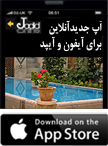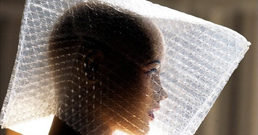Lucinda H. Dunn
Hosting around twenty film festivals in the year, London is an ebullient centre on the festival circuit. Yet despite Iran’s burgeoning avant-garde cinema, UK audiences have had to wait until this year to enjoy a festival dedicated to Iranian film.
Pejman Danaei, the Director of the UK’s first Iranian Film Festival (UKIFF), felt this gap needed to be filled: “Other festivals only offer a tiny window for Iranian materials, [yet] valuable material is coming out of Iran which does not have a platform,” he said at a press conference.
This year UKIFF, to run from 19-26 November 2010, will showcase 35 Iranian films – a mixture of features, shorts and documentaries – across three cinemas in London.
The majority of submissions were received by post, but in the final stages they opened an office in Tehran to ensure all the applications got through. Of the total 471 submissions from 53 countries around 50-60% came from inside Iran.
So why have we waited so long for an Iranian Film Festival in London?
“Because it had no political aims, particular genre or agenda it was so difficult for us to find funding or people who would commit their support to the project,” Danaei explains.
Despite the difficulties, he did not give up on the idea. As a filmmaker who has lived and worked outside of Iran for ten years, he wanted to bring his culture closer to him: “Iranian film and art fill a part of me, and I couldn’t find it here, because it really wasn’t here.”
With the aim of showcasing new talent coming out of Iran, Danaei is clear that the selection criteria was based solely on the artistic value of the films. They should be “reflections of what is happening in today’s society in Iran”, which is why as an expatriate he did not want to be on the selection committee himself. Instead he chose Iranians currently working in Iran such as screenwriter Kambuzia Partovi (The Circle) and filmmaker Mojtaba Mirtahmasb, and non-Iranians: British director Patrick Tucker and Eastern European cinematographer Zoran Veljkovic.
The non-Iranians were impressed by what they viewed, saying that the films were of a technical standard equal to European cinema.
Zoran Veljkovic was particularly taken by the “spiritual values that were so strong” in all the films. And Patrick Tucker, who has experience of Arab but not Iranian cinema, mentioned the recurring theme of death and enigmatic endings that force the audience to come to their own conclusions: “Iranian films are richer, with multi-layered messages,” he said.
The opening night film ‘The White Meadow’ by Mohammad Rasoulof has been tipped a masterpiece. A fable-like story about Rahmat, a boy who sails from island to island on salt-filled Lake Urmia collecting tears. Myth has it the tears turn to pearls as people’s sins are atoned for. Tucker describes it as “wonderful from beginning to end”, with particularly splendid cinematography: “black on white like a Bruegel painting”.
The programme spans poetic, social and political themes in different genres.
Using animation Maryam Mohajer takes on the painful subject of descending into bomb shelters during the Iran-Iraq war in 'And life went on'.
On the theme of women, we move from the artistic elite to the underclass in two poignant documentary films.
'Pearls on the Ocean Floor’ by American director Robert Adanto, intimately discusses the experiences and views of Iranian women artists such as Shadi Ghadirian, Shirin Neshat, and Parastou Forouhar, while ‘The Glass House' by Hamid Rahmanian follows young girls in a day centre in Tehran as they struggle to escape the margins of society.
Asghar Farhadi's acclaimed 'About Elly' is also being screened, as well as Jafar Panahi's new short film 'The Accordion', about a couple of street musicians.
In parallel to the film festival, UKIFF is also hosting an image contest to celebrate Iranian illustration and photography. Danaei has worked with many photographers and sees the festival as an opportunity to celebrate all of Iranian art. The finalists’ work will be exhibited at the Menier Gallery in London.
Danaei has big plans for next year’s festival, if he can secure the finances. For this year’s event he combined personal investment with the contributions of a couple of private investors in the US.
He sees the festival as an opportunity to provide an independent channel for Iranian films looking to secure distribution outside of Iran. Three of the films in this year’s festival are currently under negotiation for general release.
“There is a lot of potential for this to happen. We can be very active. We can be an outside point of contact for Iranian filmmakers to release their work,” says Danaei with excitement.


